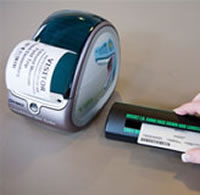
A federal judge ruled Aug. 18 that a computerized background-check system made by Raptor Technologies does not violate the constitutional rights of parents and other school visitors who undergo the checks.
Visitors to schools in the Lake Travis Independent School District (LTISD) in Texas are required to produce government-issued identification that is scanned and, through Raptor’s V-soft visitor management technology, screened for possible sex-offender status, custody disputes, restraining orders, and trespassing orders.
Yvonne and Larry Meadows, the parents of three LTISD elementary school students, had sued the district last year, arguing that providing that information was a violation of a number of constitutional rights, including freedom from unreasonable search and seizure and the right to privacy, according to court documents.
LTISD brought V-soft into its schools in response to an incident during the 2004-05 school year, in which an unidentified man entered the campus of an elementary school and exposed himself to fifth-grade students, according to court documents. Raptor’s V-soft now not only electronically checks all school visitors against registered sex-offender databases, but also replaces the paper sign-in sheets and allows schools to make and issue photograph visitor badges and electronically monitor volunteer hours.
In an interview with eSchool News, Yvonne Meadows said she and her husband, who is a lawyer, had not yet decided if they would file an appeal–though she said there were issues that she did not feel were addressed in the case.
Yvonne Meadows insisted that she did not have a problem with the schools checking the sex-offender registry. The issue for her is the fact that her license is scanned, verified via the internet, and permanently stored in the Raptor technology. The school district did not provide her with a valid reason the V-soft has to be used, she said.
“They’re using the scanning of the driver’s license not so much for sex-offender verification,” she said. “They are deceiving parents. I was told that they have to scan it to produce the visitor sticker with a picture. That doesn’t provide any better safety for my children. They’re abusing the technology. They’re abusing the parents. And they’re lying to parents.”
U.S. District Judge Sam Sparks ruled that “schools have a compelling interest in the safety of their students. Therefore, requiring production of a driver’s license in order to verify the identity and sex-offender status of a visitor is a reasonable action.” Sparks found that LTISD’s use of V-soft did not violate any constitutional rights.
“This is a victory for schools, and Lake Travis ISD should be applauded for taking a stand on this issue,” said E. Allan Measom, president and chief executive officer of Raptor Technologies. “Schools nationwide can take a deep breath with this assurance that the laws of this nation protect our fundamental rights to keep our children safe while they’re in school. This ruling should raise the national conscience on this issues, and every parent should ask how their child’s school is managing campus visitors.”
In the fall of 2006, Yvonne Meadows visited the school on a few occasions, and when asked for her driver’s license–or to provide identifying information such as her date of birth–she refused to give school officials her information. In November 2006, the Meadows parents removed their children from LTISD and are now home-schooling them, court documents show.
Yvonne Meadows filed a grievance that fall and, after being denied, appealed it through the three levels of the school district’s grievance process. She then filed suit against the Texas Education Agency and the commissioner of education in state court in March 2009, as well as filing against LTISD in federal court in September 2008.
In his opinion, Sparks wrote that both parties had fault in the case.
“Neither party in this case has acted like mature adults should act. Nor is either party in this case blameless for turning this into a federal case when it never should have been litigated in the first place,” he said, adding that it was not his role to determine the steps that are taken to keep students safe.
“In the educational world following the Columbine school shooting and the increased visibility and sensitivity to sex offenders, schools have not only an interest but a duty to take appropriate steps to protect our children while they are at school,” he said.
More than 6,000 campuses in 40 states reportedly use Raptor’s V-soft technology, and company officials say the system identified more than 1,700 sex offenders entering schools during the 2008-09 school year.
“More than 50 million U.S. students are returning to school at more than 120,000 campuses this month. Only a fraction of those schools have effective visitor-management policies, and most still use the honor system and clipboards for visitors who find time to check in at the front office,” Measom said.
Links:
Lake Travis Independent School District
- 3D equipment helps school lessons take on a whole new dimension - September 3, 2010
- IETF: AT&T’s net neutrality claim is ‘misleading’ - September 3, 2010
- To boost security, Facebook adds remote logout - September 3, 2010

